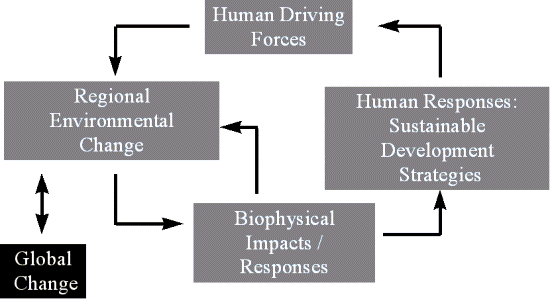
![]()
The SARCS integrated study
Louis Lebel describes an integrated study organized by the Southeast Asian Regional Committee for START (Global Change System for Analysis Research and Training).
For the past couple of decades, many parts of the Southeast Asia region have undergone rapid social, economic and environmental transformations and, more recently, economic problems.
Industrialization, urbanization and high rates of population and economic growth, together with the ongoing modifications to coastal areas and tropical rainforests, make the Southeast Asian region a “hot spot” from both sustainable development and global change perspectives. Both perspectives are inherently linked, and their analyses need to be addressed as a set of integrated scientific and socio-economic issues.
The issue of rapid regional environmental change, its causes and consequences, in Southeast Asia offers a good opportunity for the Southeast Asian Regional Committee for START (SARCS) to develop the integrated study Human Driving Forces of Environmental Change in Southeast Asia and the Implications for Sustainable Development. The thrust of the study is “living with global change” in a sustainable way, and focusing on the close interconnection between sustainable (and unsustainable) development and global change feedbacks (see Figure below).
| Conceptual framework for the Integrated Study emphasizes that the driving forces, impacts and response strategies are part of a system that feeds back on itself. |
The main goal of the SARCS Integrated Study, therefore, is to describe, understand, integrate and predict large-scale environmental changes, the natural and socio-economic factors that drive them, and their consequences for the sustainable development and management of the humid tropical marine, coastal and terrestrial ecosystems of Southeast Asia, with the primary focus on the coastal zones and continental shelf seas. This goal encompasses the full range of processes which impact on the coastal zone, including those which occur in terrestrial ecosystems higher up the catchments. The study’s overall goal is also aimed at contributing to an understanding of the role of Southeast Asia in the Earth system.
The Integrated Study will be based on a coordinated set of experimental, observational and modelling studies involving various ongoing and planned regional research programmes.
The study, through focusing on priority issues of the Southeast Asia region, will contribute to the research effort of the international global change research programmes.
|
Core Theme Structure of the SARCS Integrated Study |
|---|
|
Core Theme 1: Industrialization, Urbanization and Coastal Development |
|
Core Theme 2: Land Use, Land Degradation and Decision Making in the Rural Hinterland |
|
Core Theme 3: Institutions and Environmental Regimes |
|
Core Theme 4: Climate Variability and Change |
|
Core Theme 5: Biophysical Responses: System-level Process Studies |
|
Core Theme 6: Biophysical Responses: Extensive Observational Studies |
|
Core Theme 7: Past Environmental Changes |
|
Core Theme 8: Integration and Synthesis |
|
Core Theme 9: Sustainable Development Strategies |
The Science Plan aims to provide a well- defined and scientifically rational framework for the study so that the large number of individual, contributing studies can be designed and implemented in a coordinated way to provide a coherent regional understanding.
Key features of the Plan are as follows.
Strong and integrated involvement of human dimensions research. One of the most prominent features of the study is that human dimensions play a major role throughout the study. The social sciences are engaged both in studying the drivers of change (industrialization, urbanization, land-cover conversion, and so on) and in translating the results of the biophysical research into practical management applications. Human activities, as drivers and responders, are seen as an integral part of the environmental systems.
Modular structure. The study has been designed with a modular structure to facilitate contributions from focussed, disciplinary-based component studies and to help match research with particular funding agency interests. The nine Core Themes fall into three general areas:
(i) driving forces of environmental change;
(ii) biophysical drivers and impacts; and,
(iii) implications for sustainable development strategies.
Synthesis and integration. Along with the advantages of the modular approach, there is a significant danger that the study could become a set of largely independent individual projects (i.e. the status quo). Therefore, a component explicitly devoted to synthesis and integration, based on a scientifically designed framework, to give the regional “big picture,” Core Theme 8, has been included. SARCS should place high priority on, and take the lead in, implementing this component.
Emphasis on “living with global change.” Nearly all global change studies to date pay “lip service” to the application of biophysical research in terms of sustainable development strategies. However, virtually none take the active step of building this work explicitly into the Science Plan. The draft Science Plan includes a component, Core Theme 9, dedicated to sustainable development strategies for several key regional issues.
Policy relevance. The purpose of this study is to assist the governments and regional organizations of Southeast Asia to make informed choices concerning sustainable development. In this region of rapidly expanding economic infrastructure, the capacity of the environment to sustain a multiplicity of human uses can be profoundly influenced by policy decisions. This study aims to indicate to policy makers where and how human activity might be directed toward the more sustainable economic, infrastructural and agricultural options.
The implementation of Core Theme 9 will require strong input from the human dimensions community, especially the public policy sector.
Further information
Louis Lebel, Impacts Centre Overall Coordinator, GCTE Core Project Office, CSIRO Division of Wildlife & Ecology, PO Box 84, Lyneham, ACT 2602, Australia. Fax: 61-6-2412362. Email: llebel@dataserv.com.au.
On the Web
Southeast Asian Regional Committee for START (SARCS)
